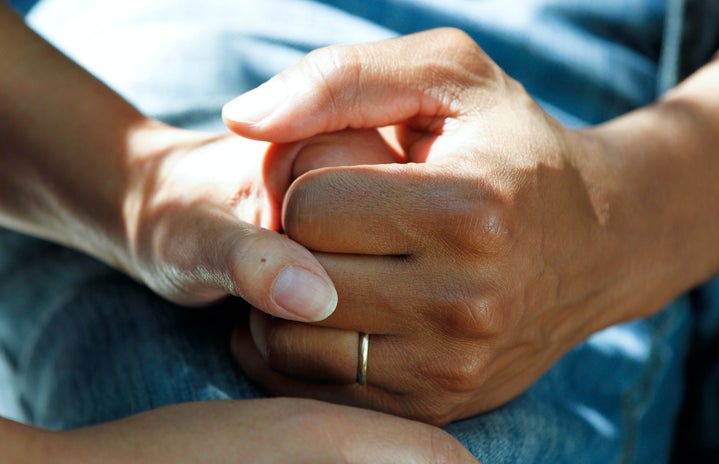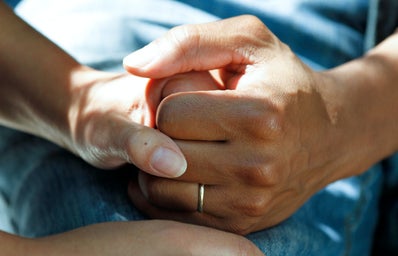“I walk up the steps and I go inside. Oshima lights a larger lamp suspended from the ceiling.” I do not flip the page. My grand-aunt weeps for her brother. My mother and aunt, for their father.
“I walk up the steps and I go inside. Oshima lights a larger lamp suspended from the ceiling.” My uncle carries my grandfather bridal style, his corpse wrapped in white linen. I don’t envy this wedding. Death, the inevitable groom.
“I walk up the steps and I go inside. Oshima lights a larger lamp suspended from the ceiling.” I refuse to tear my eyes from the page, but they can only reread the same two sentences. I cry silently, the words muddled through translucent tears. He was alive 3 hours ago.
Barely.
Death Without Dignity
My grandfather’s cancerous death comes decades after that of his late wife, a cancer victim herself. Perhaps that was why he felt mildly prepared and kept his sickness a secret until he could no longer care for himself.
When I heard the news two months prior, I made a note to go down to Atlanta to see him after my semester ended. He was still walking and talking and telling the exaggerated stories of his life, after all. A week before his death, I received a text: “He doesn’t have much time.” He was weaker, though awake, and feisty as ever. On the dawn of his departure, an unconscious skeleton of a man lay in front of me, pumped up on morphine, waiting for death. For weeks, his wife and his sister would have to administer medicine every 2 hours on a 24-hour cycle. His wife slept beside him until the end, even as she knew his consciousness would never return.
After the death, the tears and the initial grief, I wondered to myself if his needlessly painful end had been so common and if it needed to be so. A quick Google search told me that for most of the United States, the options were limited.
Death With Dignity
Physician-assisted suicide (PAS) – also referred to as assisted dying, medical aid in dying, and death with dignity – is the act of a physician providing life-ending drugs to a patient so that they can end their own life. This is similar, though distinctly different from euthanasia, also referred to as ‘mercy killing’ where the life is ended by the physician, such as through lethal injection administered by the physician.
‘Death with Dignity’ is the top end-of-life advocacy organization in the U.S. Their mission “focuses on improving how people with terminal illness die,” stating core values of dignity, freedom and autonomy, trust, financial stability, moral courage and DEI. Through their advocacy and education, as well as the work of others, the U.S. is currently home to 11 states and jurisdictions that have a death with dignity law, including California, Maine, Oregon, Colorado, Montana, Vermont, New Jersey, Washington, Hawaii, New Mexico and the District of Columbia. Over a dozen more states are considering death dignity acts, as of March 2024.
Public Opinion Towards Euthanasia and Physician-Assisted Suicide
Support for these types of end-of-life options has been gradually increasing in the U.S. Support and moral acceptance, however, are two different measures of public opinion. According to the Statista Research Department, the moral acceptance of doctor-assisted suicide has grown from 49% to 55% from 2001 to 2005. A Gallup poll from 2018 includes additional questions: With 72% of poll-takers believing that doctors should be able to help terminally ill patients die, a lower 65% believe so when the question includes “commit suicide,” and 54% believe it’s morally acceptable for physicians to assist. All of these numbers have risen cumulatively since 2001, though in some years they may have slightly dipped.
According to the same Gallup poll, the demographics who most support euthanasia and physician-assisted suicide are younger generations, Democrats, Liberals and those who seldom or never attended church. This may likely be due to many factors including the traditional religious (particularly Christian) belief that suicide is a sin.
The Right to a Dignified Death
Ultimately, Death with Dignity’s first core values best demonstrate the arguments for physician-assisted suicide: Dignity, autonomy and freedom. I believe apart from many valid concerns of physician-assisted suicide, many people are blinded by their own anguish, scared of losing the ones they love, even if it’s painful, miserable and inevitable. Why, I wonder, can so many people understand the necessity of animal euthanization, but not PAS? Obviously, we are not animals and our lives are of more value, yet often the pain is the same; the grief is similar. And humans have one thing that animals do not: Consent. Regardless, this is not a PETA petition meant to equate humans to pets. Ultimately, it boils down to the right to bodily autonomy; the right for the terminally ill to choose their end and have self-determination over their body. Terminally ill patients should have the right to end their life with dignity, on their own terms and of their own willful fruition.
To better understand the argument for PAS, one should also understand the arguments against it. There are many counterarguments (see here, here, and here) to death with dignity, though I will only regard the most popular concerns of nontheistic reasoning.
Goes against the Hippocratic oath: One of the most popular counterarguments is that PAS is a violation of physician ethics, particularly the Hippocratic Oath sworn by physicians to pledge their adherence to respecting patients, teaching and preserving life among other doctrines. The Hippocratic Oath, created over 2000 years ago, has been revised by many, and is no longer law, but tradition. The original specifically prohibited abortion and euthanasia, stating “I will neither give a deadly drug to anybody who asked for it, nor will I make a suggestion to this effect. Similarly I will not give to a woman an abortive remedy. In purity and holiness I will guard my life and my art,” though modern versions have replaced this excerpt with “Most especially must I tread with care in matters of life and death. If it is given me to save a life, all thanks. But it may also be within my power to take a life; this awesome responsibility must be faced with great humbleness and awareness of my own frailty. Above all, I must not play at God”. However, it is important to note that physicians already perform other end-of-life actions such as withdrawing life-support, adhering to ‘do not resuscitate’ orders and administering palliative sedation (medicated to reduce consciousness to relieve suffering, typically until death) that also violate the oath’s traditional pillars of reducing harm and giving preventative care. Modern medicine has also evolved to emphasize patient autonomy and the oath must change with it.
No required psych evaluation: What distinguishes a mentally unwell suicidal person from a terminal patient who wants death? For one, the main difference is the involvement of a secondary player (the physician) in the decision to end a patient’s life. Secondly, the patient’s life is already at its unfortunate end and their suicide is a choice made under the supervision of medical professionals. Many, if not all states where death with dignity is in effect require the patient to be eligible by a variety of factors: At least 18 years old, have less than six months to live as confirmed by two physicians, must be mentally competent, be able to swallow the pill on their own, and confirm their request twice verbally (separated by some time depending on the state) and once in writing. Someone who fits this description is more than capable of taking their own life, they should be afforded the comfort and dignity to do it.
Pain is not the number one issue: Oregon’s 2015 analysis of its Death with Dignity Act listed of 155 patients who were prescribed the lethal drug, the top three reasons were “loss of autonomy (91.4%), decreasing ability to participate in activities that made life enjoyable (86.7%), and loss of dignity (71.4%).” One should also note that 93% of these patients were enrolled in hospice care when given the prescription or at their time of death. Many of these patients may have lost the ability to move or take care of themselves. While they may not have been particularly in pain at the time it was prescribed, it does not mean that this would continue to be the case. Why must they wait until their body inevitably shuts down and their illness consumes them? Additionally, why can one legally request palliative sedation which would make them unconscious indefinitely, but not request to peacefully and with dignity end their life? Ultimately, as previously stated, PAS is meant to provide dignity in death to those who are terminally ill, regardless of their pain levels.
Devalues the sanctity of human life: The sanctity of human life is the belief that all human life is sacred and should always be protected. While this is certainly a virtuous thought, it is also rooted in religious belief and has often been used as reasoning to prevent abortion and euthanasia. Apart from the fact that many religious followers in the U.S. have directly and indirectly opposed the sanctity of life (an average of 62% of religiously affiliated adults in the U.S. favor the death penalty, for example), using religion as a basis for morality and ethics is at the most, completely irrational, and the least senselessly contentious. Either way, as the U.S. is not a theocracy, legislation should not be subjugated to religious belief.
Physician-assisted suicide is ultimately a complex issue, wrapped in debates of compassion, autonomy, sanctity of life and dignity. Though we may all wrestle with the idea of our own mortality, we must accept those who rightfully challenge it. We fear loved ones’ deaths and our own grief, but for those at the end of their life, the right to choose how they pass is not just compassionate, but essential. Though I will not speak for my grandfather nor how he would have wished to exit this world, I would only hope for this difficult choice to be given to others like him.


